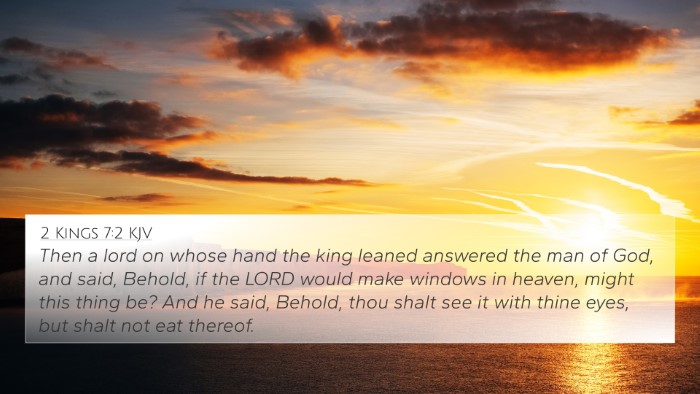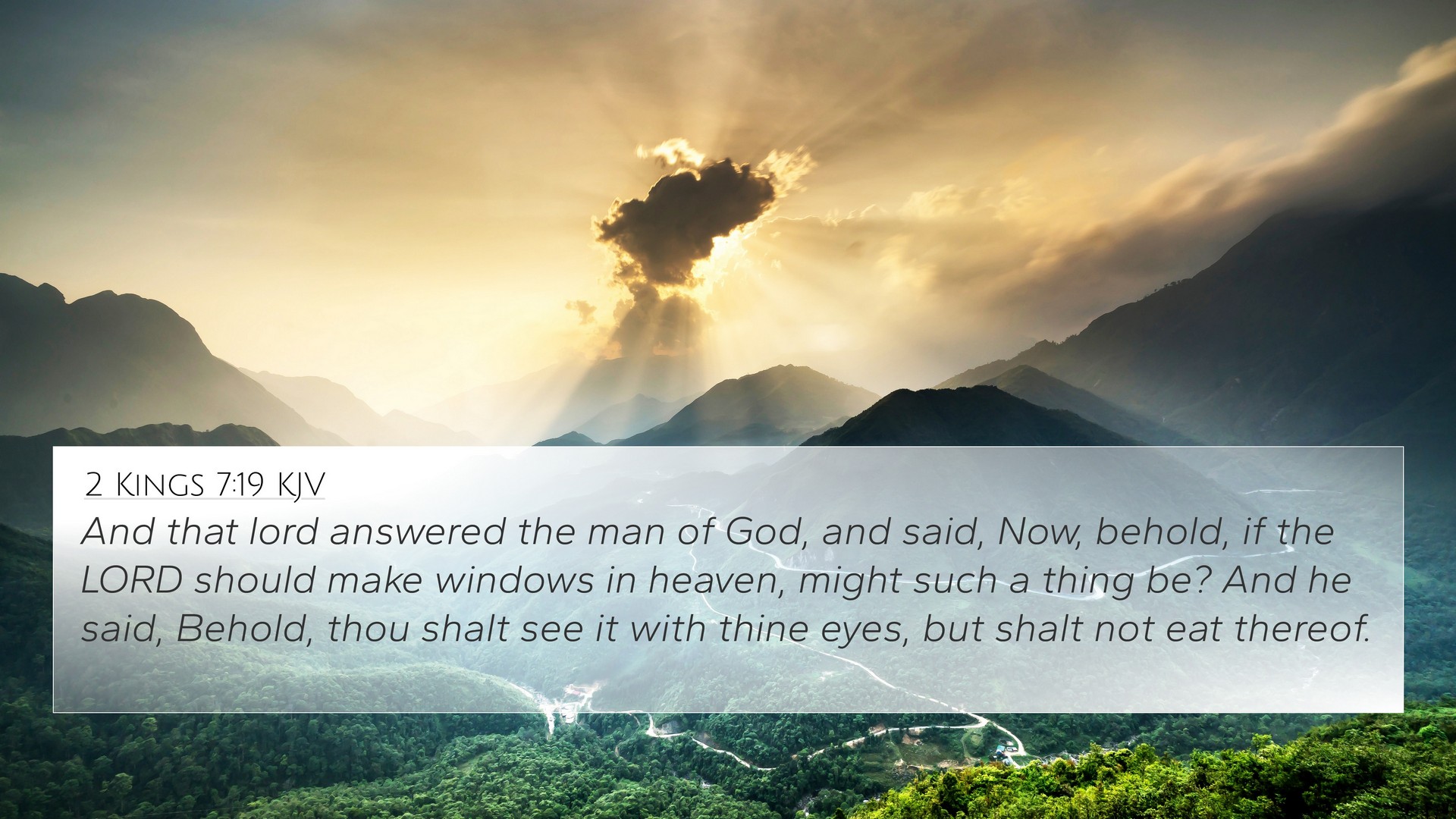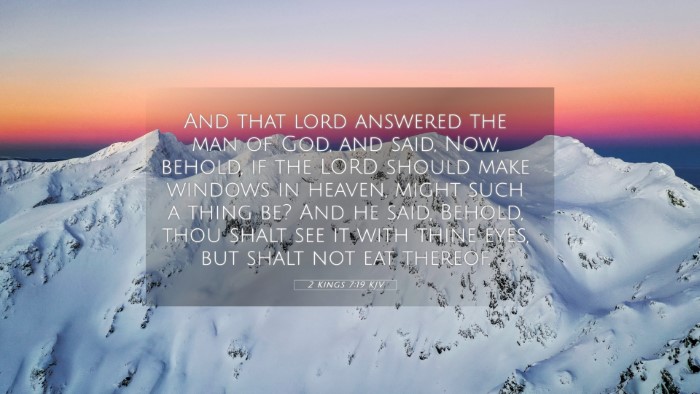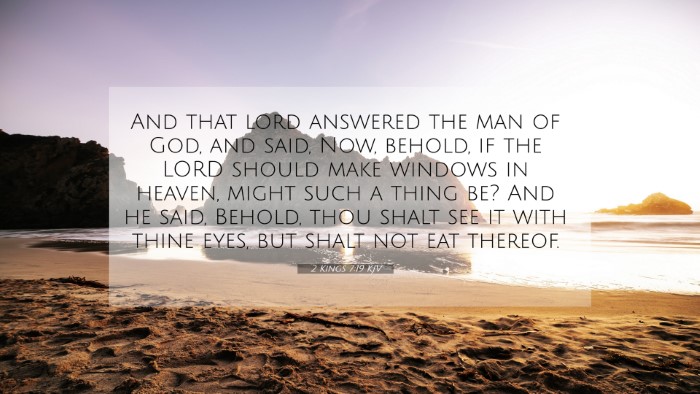Old Testament
Genesis Exodus Leviticus Numbers Deuteronomy Joshua Judges Ruth 1 Samuel 2 Samuel 1 Kings 2 Kings 1 Chronicles 2 Chronicles Ezra Nehemiah Esther Job Psalms Proverbs Ecclesiastes Song of Solomon Isaiah Jeremiah Lamentations Ezekiel Daniel Hosea Joel Amos Obadiah Jonah Micah Nahum Habakkuk Zephaniah Haggai Zechariah Malachi2 Kings 7:19 Similar Verses
2 Kings 7:19 Cross References
And that lord answered the man of God, and said, Now, behold, if the LORD should make windows in heaven, might such a thing be? And he said, Behold, thou shalt see it with thine eyes, but shalt not eat thereof.
Uncover the Rich Themes and Topics of This Bible Verse
Listed below are the Bible themes associated with 2 Kings 7:19. We invite you to explore each theme to gain deeper insights into the Scriptures.
2 Kings 7:19 Cross Reference Verses
This section features a detailed cross-reference designed to enrich your understanding of the Scriptures. Below, you will find carefully selected verses that echo the themes and teachings related to 2 Kings 7:19 KJV. Click on any image to explore detailed analyses of related Bible verses and uncover deeper theological insights.

2 Kings 7:2 (KJV) »
Then a lord on whose hand the king leaned answered the man of God, and said, Behold, if the LORD would make windows in heaven, might this thing be? And he said, Behold, thou shalt see it with thine eyes, but shalt not eat thereof.
2 Kings 7:19 Verse Analysis and Similar Verses
Understanding 2 Kings 7:19
Bible Verse: 2 Kings 7:19
"And that officer had answered the man of God and said, ‘Now look, if the LORD would make windows in heaven, could this thing be?’ And he said, ‘In fact, you shall see it with your eyes, but you shall not eat of it.’”
Summary of Meaning
This verse reflects a pivotal moment in the narrative of the siege of Samaria. It exhibits the stark contrast between faith and disbelief as illustrated by the officer's skepticism in response to the prophet Elisha's proclamation about the miraculous provision of food. The deeper implication of this verse carries significant theological insights.
Thematic Insights
- The power of God’s word to bring transformation and sustenance, even when circumstances appear dire.
- The judgment on skepticism, demonstrating that disbelief can yield consequences.
- The importance of faith in receiving the blessings God has promised.
Commentary Insights
The insights from various commentaries provide a rich understanding of the implications of this verse:
Matthew Henry’s Commentary
Matthew Henry emphasizes that the officer’s reply showcases his doubt about divine intervention. He highlights that this skepticism leads to a prophetic warning that although the officer will witness God's deliverance, he will not partake in it, signifying the grave consequences of his unbelief.
Albert Barnes’ Notes
Barnes discusses how the officer's statement reveals a human perspective that underestimates God's ability to operate outside of conventional limitations. Furthermore, God’s ability to fulfill His promises, even in the impossible, is a major theme—underscoring the difference between human logic and divine action.
Adam Clarke’s Commentary
Clarke indicates that the response of the officer illustrates a common challenge faced by believers: reconciling faith with apparent impossibility. This narrative serves as a reminder of the peril of allowing one’s circumstances to dictate belief in God’s capabilities.
Cross References
To deepen the understanding of 2 Kings 7:19, here are relevant Bible cross-references that elucidate its themes:
- 2 Kings 6:25-27: The prior context of Samaria’s siege underscores the despair faced by the people.
- Isaiah 55:8-9: God's thoughts and ways are beyond human understanding, emphasizing divine sovereignty.
- Luke 1:37: “For with God nothing shall be impossible,” showcasing God's omnipotence.
- Mark 6:6: Jesus’ experiences with disbelief reflect a recurring theme of skepticism among those He sought to save.
- John 11:40: Faith leads to the seeing of God’s glory, paralleling the outcomes of belief versus disbelief.
- Hebrews 11:6: Highlights the necessity of faith, for it is integral to receiving from God.
- James 1:6: Encourages unwavering faith, denouncing doubt as detrimental.
Conclusion
The verse 2 Kings 7:19 serves as a powerful reminder of the intersection between faith, divine promise, and human skepticism. The tragedy of the officer lies not only in his disbelief but also in his missed opportunity to partake in God’s miraculous provision. This narrative encourages believers to examine the role of faith in their relationship with God and to understand the transformative power of trusting in His promises, no matter how daunting the circumstances may seem.


